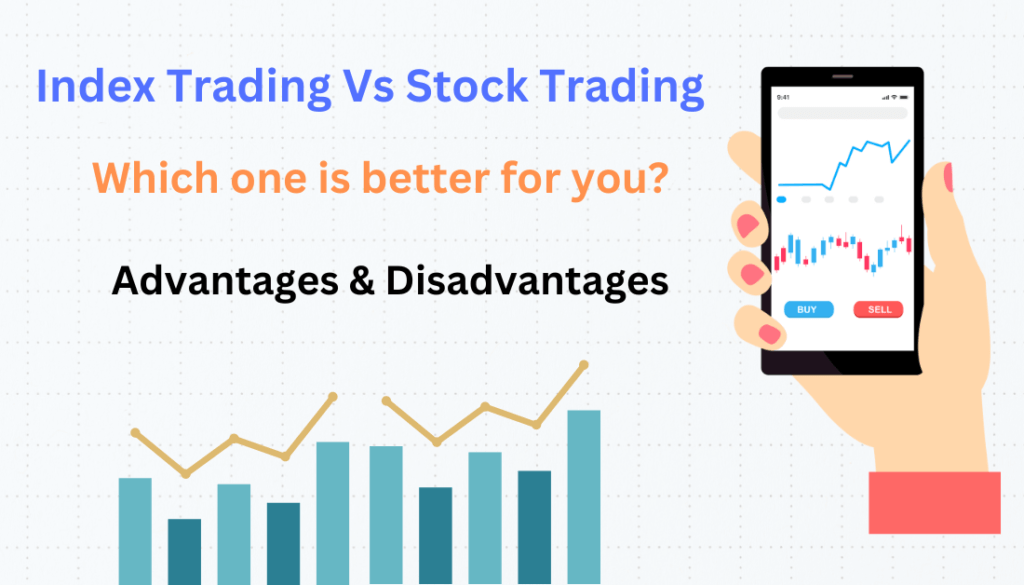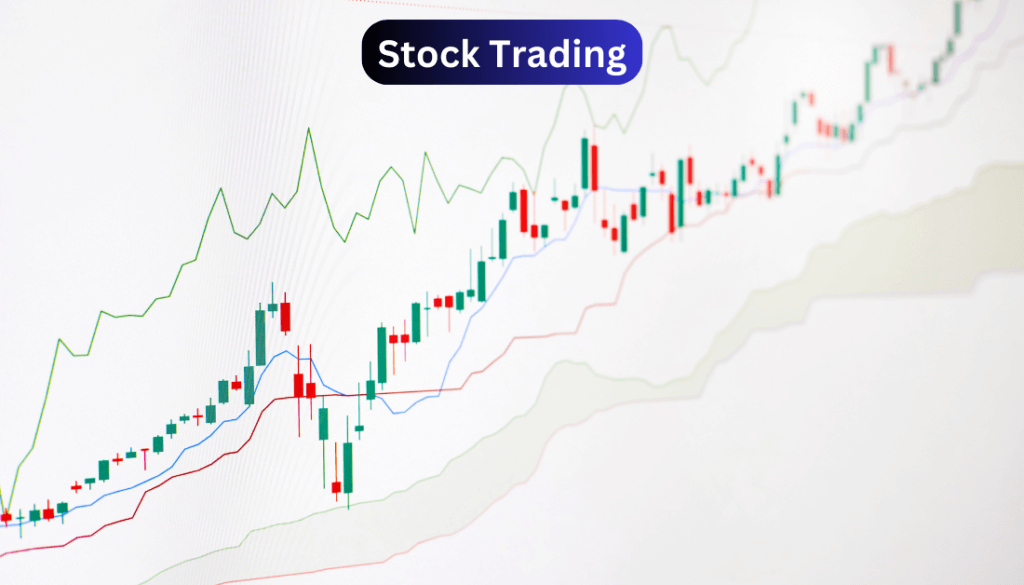
Index Trading Vs Stock Trading: Many traders are confused whether they should trade in indices or trade in stocks because there are many traders who prefer trading in indices and there are many traders who prefer trading in stocks.
So what are the differences between index trading and stock trading and sometimes it’s also heard that you should not trade in index. so in this article, we will cover what are the differences and which is different. What are the advantages and disadvantages and which trading should we do?
What is index trading?
In index trading, you make multiple investments with an investment. Indices like Nifty 50 are graded on the basis of market cap. If you invest Rs 1000 in nifty 50, then this money gets distributed in 50 shares. With this, you invest Rs 1000 in all the shares of nifty 50.
Index trading can be done through index funds, ETFs or futures & options. It’s very easy to take a chance on any growing sector in index trading. You can invest in any sector by betting on sectoral indices like bank nifty, nifty IT index and nifty auto index.
Not only this, but when you trade on the sectoral index, you invest all the stocks of that index with just one investment. That means you get the advantage of inter-sector diversification after the intra-sector. [Index Trading Vs Stock Trading]

Read More: 10 Great Ways to Learn Option Trading in 2024
Advantages
- Many traders prefer index trading because of liquidity. If we talk about derivatives or segments of futures and options, then you get the highest liquidity only in indices. Due to liquidity, almost all traders prefer trading in indices.
- In index trading, you can enter and exit with multiple lots. Pro traders can easily enter and exit with lakhs of lots in index. Some people take the help of an algorithm for this and some people also take help of excel sheets and some people also do it manually and in index trading your slippages are also less.
- If you keep practicing the same index again and again, that means you focus on it, then you start getting an idea of the movement of the index. By focusing on only one or two indexes daily, we get the advantage of an idea of how this index gives movement.
- Because the index is a group of many stocks, its technicals are quite strong, which means that its technical analysis works very well in particular stocks.
- If you are an option trader then you can comfortably do mean reversion trading in the index. If there is no sharp movement in any index then you can sell out of the money (OTM) call & put and you can also get the benefits of theta decay.
- If we talk about index trading then you can get a swing of 100, 200 or 300 points or 500 or 1000 points on some day, especially if we talk about Bank Nifty. If you are an options trader, then you can make good money in index trading.
- There is one more thing that helps you in this index trading which are hedging strategies and even if we talk about all options selling strategies then all the non-directional strategies get a lot of exposure through index trading. [Index Trading Vs Stock Trading]
Disadvantages
- Whenever you do index trading, there will be no variety. You have only two indexes bank nifty and nifty where there is liquidity. And if it went sideways, then you will not be able to make any money.
- Whenever we talk about index trading, you have the option mostly to trade in futures and options. So the problem becomes that even if a new beginner comes then unfortunately he gets trapped in the clutches of leverages because future and options are always a leverage instrument.
What is stock trading?
In stock trading, before buying a stock you do a technical analysis or fundamental analysis of that stock and then invest in it or you can take an expert’s advice and invest in individual stocks.
You can do stock trading online through a trading platform or through a broker. It’s very risky to focus only on one sector in stock trading and it’s comparatively expensive.

Advantages
- In stock trading, where there is multiple variety from multiple opportunities, so you can prefer them. Secondly, stocks are better for proper swings.
- When we trade in the stocks, we can also trade in small quantities. For example, if you want to trade in Reliance, then you can buy 1, 2, 5 or 10 shares as per your wish, you take leverage in the stock, even at low risk.
- When you trade in stocks, you can trade even with small capital. If you have an account of Rs 5,000, 10,000 or even Rs 15,000 then also you can trade.
- If you like movements then the chances of getting good movements in the stocks are very high. If you are a trend follower and you want good quick movement in a day then you can do stock trading. [Index Trading Vs Stock Trading]
Disadvantages
- In stock trading, we buy futures or options in huge quantities. Many times it may happen that you want to sell but there is no buyer. If this happens then you can get trapped many times.
- If we talk about stock trading, then because there is only one single stock, it can also have a strange movement depending on lot of reasons. Suppose if there is some good news and the stock is going down, then surely that stock can give a huge gap up.
- When any stock has its quarterly earnings, then the movement that comes due to it can also be very fast. We also heard that if there is insider trading or manipulation that’s taking place, then the stocks can move very strangely.
Read More: 12 Best Paper Trading Apps in India for 2024
Index Trading vs Stock Trading: Which is better to trade?
Index Trading | Stock Trading |
Benefit from diversification without efforts | Portfolio diversification is not easy |
No individual stock analysis required | Have to do stock analysis at all times |
Passively managed | Actively managed |
Stable prices notwithstanding the market volatility | Frequently buying and selling |
Low Returns | High returns, high risk |
Any loss in a particular sector is negated by the good performance of other stocks in the index | High chances of loss |
Index trading and stock trading both have some advantages and disadvantages, Which path you want to take depends on your investment goals. It’s also important for you to know how much risk you want to earn profit on.
If you want to earn profit by taking less risk, then index trading is the right way for you. If you are a new trader and you don’t know the analysis of stocks then you can choose index trading, also you get the benefit of diversification without any effort.
On the other hand, if you want to take a lot of risk and earn a lot of profit, then stock trading is right for you. If you have the experience of investing in the share market and you can also do the analysis of stocks, then you can earn a lot of profit through stock trading. [Index Trading Vs Stock Trading]
Conclusion
Any beginner should always first do stock based trading before doing index trading. It increases their confidence. Secondly, they do not make mistake of taking unnecessary leverage. Also, they are able to understand market dynamics very well, every stock is reacting in different ways, so it becomes more understandable.
As stock specific has a new action every day, so our preparedness also increases. So the moral is that both the fields have good possibilities and both the fields have merits and demerits. At the end, you have to pick which suits you.
When your capital becomes bigger then you can do index trading, which means when your lot size becomes more then you will start getting liquidity in the stocks which you will be able to do comfortably in the index.
I hope you have liked the information we have shared in this article, to know more about trading you can read our other articles too. [Index Trading Vs Stock Trading]
Read More: 12 Best Stocks to Invest During Elections 2024
Frequently Asked Questions –
1. What is the difference between stock trading and index trading in India?
The first difference is the lot size. If we talk about index trading, the lot size of Nifty 50 is 25 and the lot size of Bank Nifty is 15. And if we talk about stock trading, the lot size of each stock is different. The second difference is the liquidity.
You will see high liquidity in the index trading, whereas in the stock trading, you will see low liquidity.
The third difference between these two is that in the index trading, both weekly and monthly expiry are available, whereas in the stock trading, only monthly expiry is available.
2. Which is better index option or stock option?
The simple answer to whether you should trade in index options or stock options is that you should trade in index options. The reason is that you are not going to face any problem of liquidity.
The second reason is that you will not face any in the money (ITM) problems in index trading. If in the money stock goes out on expiry, if you have bought then you will have to do full exercise. So you will not get to see all this in the index option.
The third reason is that because you can’t master every stock, it’s very difficult you have to give a lot of time to it, but you can master Nifty and Bank Nifty if you give it proper time.
3. Should I invest in index or stocks?
You can invest in both index and stocks, both of them have some risk and can get high returns, so you can make good profit by investing in both of them.
4. Is trading index profitable?
Yes, trading index can be profitable, but it totally depends on the market conditions, your strategy and how effectively you manage your risks. There are many traders who are profitable in index trading because they strictly follow discipline, trading plans and risk management.
5. How to learn index trading?
The best and cheapest ways to learn index trading is through YouTube videos. Through YouTube videos, you can learn index trading and that too free of cost. Apart from this, if you want to learn quickly then you will get many types of courses from which you can learn.
This topic is very interesting content which you are well by grace of Almighty.